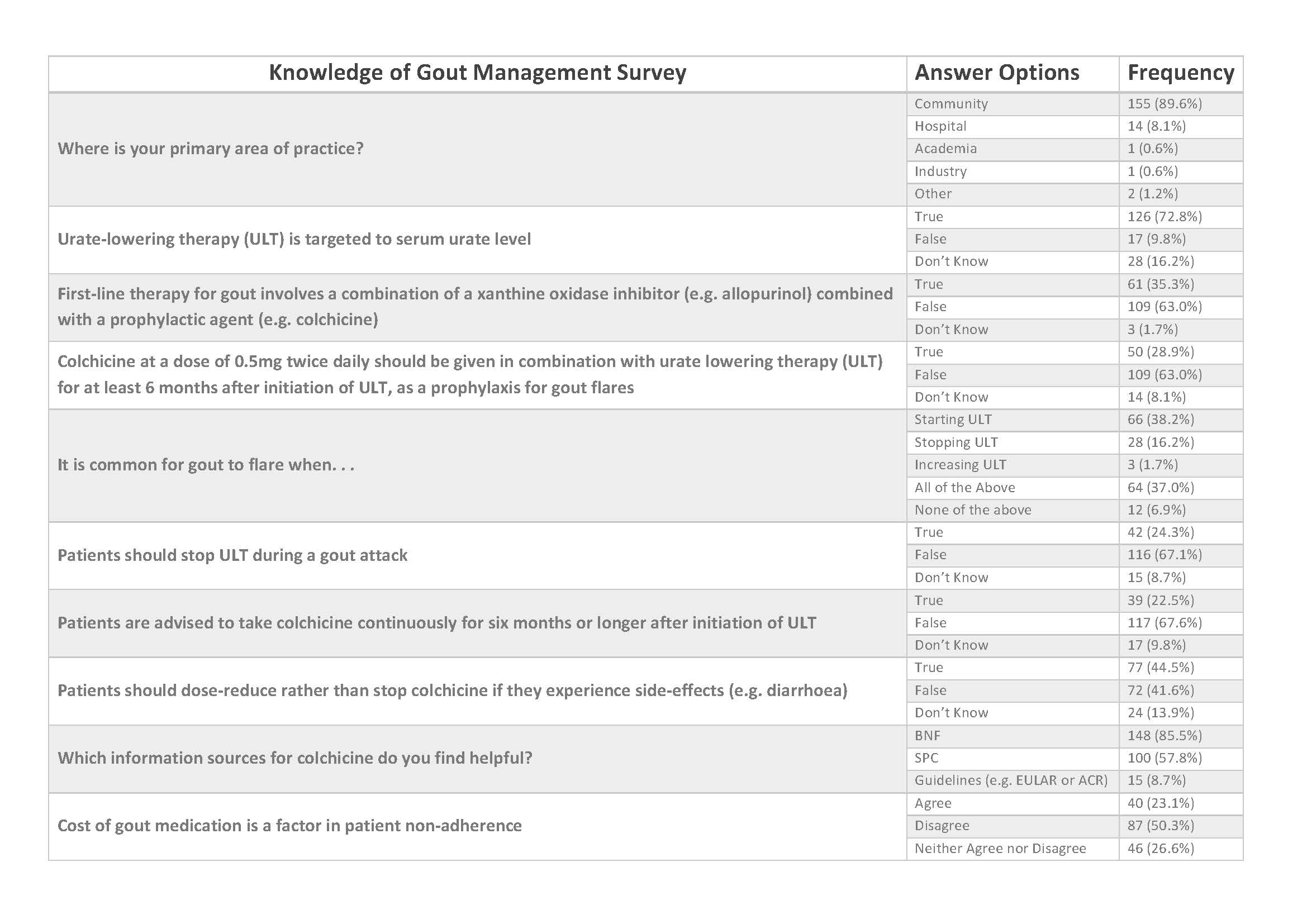Session Information
Session Type: Poster Session B
Session Time: 9:00AM-11:00AM
Background/Purpose: Urate lowering therapy (ULT) is recommended for long-term gout management. However, gout flares are common at the time of starting ULT, and these flares can impact on adherence to ULT. Co-prescription of low dose colchicine as anti-inflammatory prophylaxis is recommended for the first 6 months of ULT. Pharmacists play a key role in community gout education. We investigated pharmacist knowledge of gout treatment. In response to the findings, an educational intervention was developed and assessed in a cohort of Irish pharmacists.
Methods: A ten-question questionnaire about gout management was developed as per Kelley (2003 (1)). Non-random sampling was used. The survey was disseminated through the Pharmaceutical Society of Ireland, PharmaBuddy (a pharmacist-only closed forum) and word-of-mouth. Survey analysis employed factor analysis with varimax principal component analysis (PCA) and frequency analysis. An educational intervention was co-developed between a consultant rheumatologist and a general practitioner who also works as a community pharmacist in the form of a 13-minute video tutorial on pharmaceutical gout management. The effectiveness of this intervention was assessed via the same questionnaire in a cohort of n=53 (n=25 intervention group; n=28 control group of pharmacists who had not watched the video). Data was analysed via frequency analysis using Pearson’s Chi-Square test for association between groups.
Results: There was n=173 pharmacist respondents to the initial survey. 63% did not know that first-line therapy for gout involves a combination of a xanthine oxidase inhibitor combined with a prophylactic agent. 22.5% of respondents knew patients were advised to take colchicine continuously for six months or longer after initiation of ULT. 28.9% selected ‘true’ to the statement that colchicine twice daily in combination with ULT acted as a prophylaxis for gout flares. Regarding side-effects, 45% believed patients should dose-reduce rather than stop colchicine if they experience side-effects such as diarrhoea, with 42% selecting false and 14% unsure. (Table 1).
Following educational intervention, pharmacists where more likely to know patients are advised to take colchicine continuously for six months after initiation of ULT (84% intervention group compared to 36% control, p=0.002). Furthermore, they understood colchicine was given up to twice daily in combination with ULT as a prophylaxis for gout flares (84% intervention, 32% control, p=0.001) and that the goal of ULT is to reduce serum urate level (96% intervention, 68% control, p= 0.029). There was no difference in community: hospital practice between intervention and control groups (p=0.74).
Conclusion: Gout management recommendations can be impeded if translation into pharmacy practice is neglected. Pharmacists are a valuable information resource for patients. Low-cost educational interventions can greatly improve their knowledge of gout management and in turn empower patients to assume self-management of gout.
 Knowledge Of Gout Management Survey
Knowledge Of Gout Management Survey
To cite this abstract in AMA style:
Dorris E, Ryan P, Kieran M, Dalbeth N, McCarthy G. Gout Management Beyond Prescription Writing: The Role of the Pharmacist [abstract]. Arthritis Rheumatol. 2020; 72 (suppl 10). https://acrabstracts.org/abstract/gout-management-beyond-prescription-writing-the-role-of-the-pharmacist/. Accessed .« Back to ACR Convergence 2020
ACR Meeting Abstracts - https://acrabstracts.org/abstract/gout-management-beyond-prescription-writing-the-role-of-the-pharmacist/
